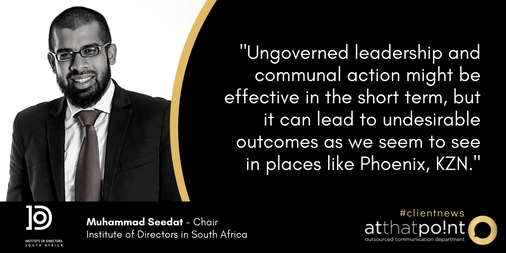|
Many commentators have pointed out that the recent riots in KwaZulu-Natal had a silver lining in the way that communities quickly banded together to protect themselves and maintain law and order. Less commented on is the master class the riots and near anarchy gave on the importance of governance in delivering good outcomes, argues Muhammad Seedat, Chair of the Institute of Directors in South Africa (IoDSA) and himself a “veteran of the barricades” in Durban.
“It’s true what they say—the crisis truly brought local communities together in quite a remarkable way. Now that some of the dust has settled, though, it seems as though the outcomes for some communities are not so positive,” he says. “In these communities, I believe, the unfortunate outcomes can be traced to a lack of governance.” Mr Seedat says that what was remarkable about his experience was how rapidly his community came together and put governance structures in place on the fly. It was this that enabled them to mount a successful defence of their community without overstepping the mark. “One can argue that adopting leadership structures and hierarchies in times of crisis is hardwired into the human genome, but what sets the successful communities apart is how well that emergency leadership was able to deliver the desired outcomes. Ungoverned leadership and communal action might be effective in the short term, but it can lead to undesirable outcomes as we seem to see in places like Phoenix,” he says. “One key thing we did was to identify the threats we faced and what the appropriate responses were. We knew very well that a key risk for us was the death of any community member or alleged perpetrator. Without this kind of analysis, it’s very easy to overstate the risk and thus deliver an inappropriate response—excessive force might deliver short-term results but then the community has to live with the fallout over the long term.” He believes that the more affluent areas were helped in crafting a response that was both effective and morally justifiable because many of the community members were familiar with the principles of governance from their work lives, and so automatically applied those principles in the emergency. By contrast, areas like Phoenix probably lacked individuals with deep experience of, and expertise in, governance and might thus be more prone to losing control of the situation. “In our area, and I’m sure in other similar ones, the leaders had to play an educative role as regards the need for some form of governance, and how it would provide a structure through which the skills that people had to offer would be enabled to make the best possible contribution,” he says. “For me, it was a real lesson in how governance can be deployed fast and almost organically, and how it truly does increase the chances of delivering the best possible result.” ENDS MEDIA CONTACT: Stephné du Toit, 084 587 9933, [email protected], www.atthatpoint.co.za For more information on the IoDSA please visit: Website: www.iodsa.co.za Twitter: @The_IoDSA LinkedIn: Institute of Directors in Southern Africa Company Page
0 Comments
Leave a Reply. |
Archives
July 2024
Categories
All
|


 RSS Feed
RSS Feed